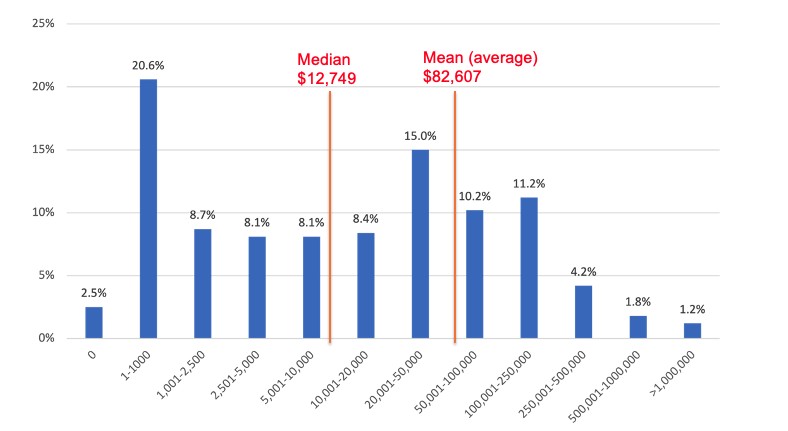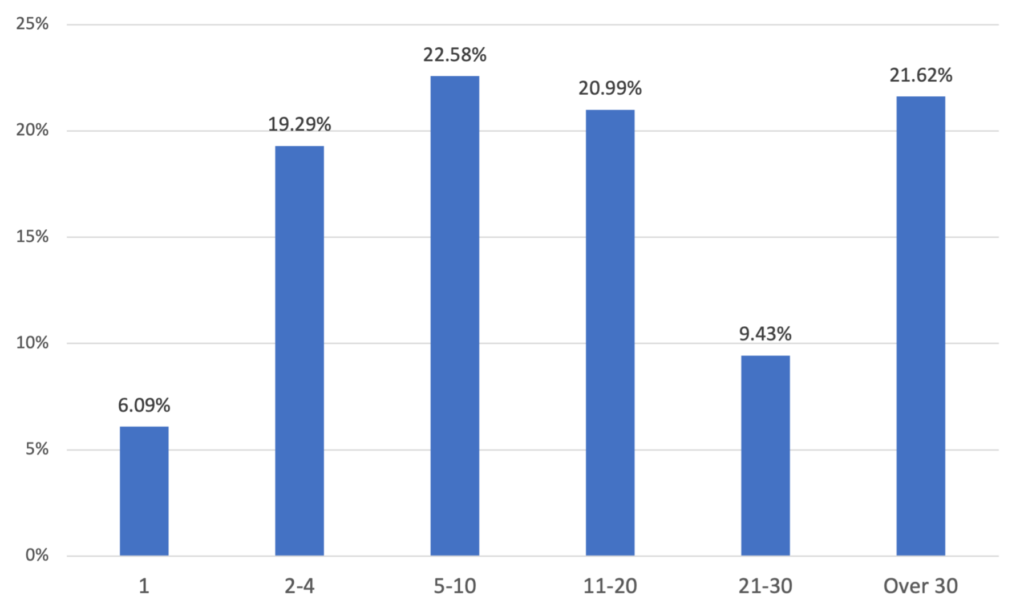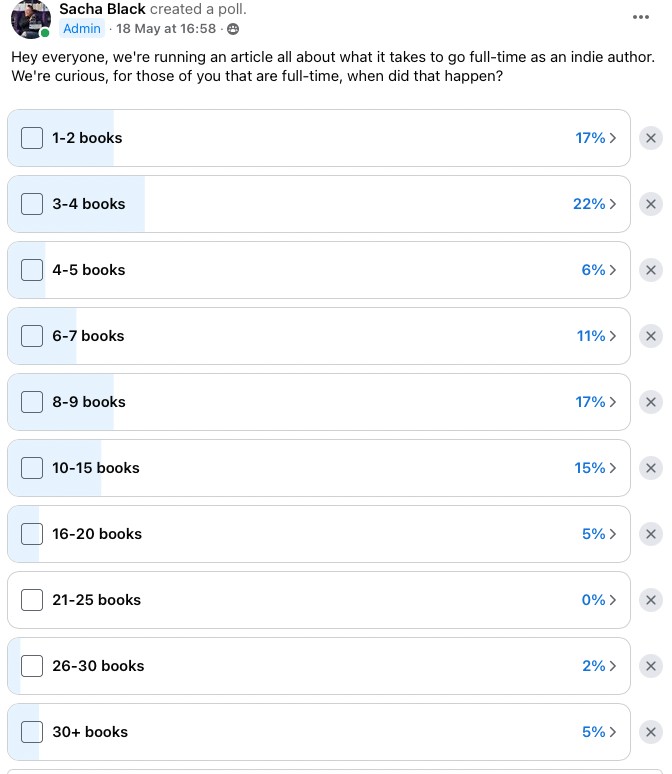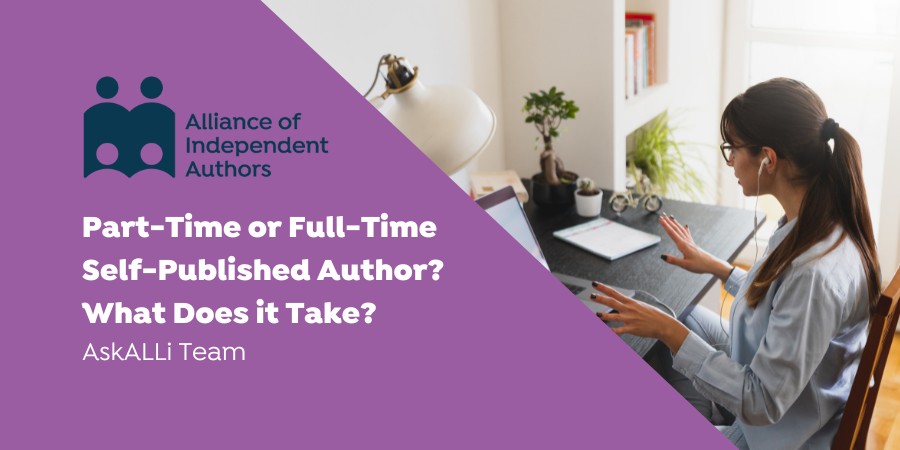Making a full-time living from writing and publishing is something that many authors aspire to but for others permanently part-time is the better choice. Neither is easy, but both can be immensely rewarding, creatively and commercially. Today, the Alliance of Independent Authors team is looking at what it takes, whichever way you choose.
Part-Time or Full-Time Self-Published Author? What Does it Take?
When you ask a writer what their goal is, the most common answer is to write full-time. It seems to be on the one shouted the loudest in the community. But it certainly isn't everyone's goal, nor should it be. The decision to go full-time will depend on a number of factors, including the individual author's circumstances, financial situation, capabilities, and aspirations.
Anyone who's read Seth Godin's concept of “The Dip” will know this concept can be applied to any industry, including publishing. Essentially, (and this is paraphrased) in any industry or on any path to success, there's a huge drop off of people because once the initial bump of success is over, a person or business will begin to encounter problems and difficulties (hence the dip).
Persevering through the problems, fighting through such plateaus, is how we eventually see success. When considering if you want to write full-time there are three things to hold top of mind: financial security, time and pace, and market awareness.
- Financial Security: Full-time self-publishing means relying on your book sales as a primary income source. It can be risky, especially in the beginning when you're still building your readership. Part-time self-publishing allows you to have a stable income from another job while you develop your writing career.
- Time and pacing: If you write full-time, you have more hours to write, edit, promote, and handle other aspects of the self-publishing process. However, this also means that all responsibilities, including managing deadlines and keeping up with the business side of publishing, rest on your shoulders. Part-time authors have to juggle their writing time with their other responsibilities, which can be challenging but also provides more balance and less pressure.
- Market Awareness: The publishing market can be unpredictable, and trends can change quickly. Full-time authors may feel more pressure to write books that sell, which could potentially limit creative freedom. Part-time authors might have more liberty to write what they are passionate about without worrying too much about sales and more flexibility to adapt to market changes without immediate financial repercussions.
Part-Time or Full-Time Self-Published Author: What Does the Data Say?
Melissa Addey, ALLi Campaigns Manager explains what our recent Author Survey data says.
It’s a big jump to go full-time as an author. How to know when it’s the right time? How to know if you’ve prepared enough and are ready for it? The truth is that moment comes at a different place for everyone, but a bit of data might help us out here.
Based on ALLi’s recent Indie Author Income Survey (you can read it here on our self-publishing 3.0 campaign page, dedicated to authors making a living) and with a tiny sneak peek ahead at our Big Indie Author Data Drop (BIADD, coming in June), here five things that might help your planning.
The basic fact is: you need to earn money. So, from our survey:
- You’re more likely to make a living if you self-publish. This was the big stand-out message. If you’re a member of ALLi already, we may be preaching to the converted, but the facts stacked up. Median revenue in 2022 for self-published authors was US$12,749 and growing at 53%. By comparison, recent global surveys saw the following median incomes amongst traditionally published authors:
- 2022 UK: US$8,600, down 38.2% since 2018 (Authors’ Lending and Collection Society)
- 2018 Canada: US$6,990, down 27% since 2015 (Writers’ Union of Canada)
- 2018 US: US$6,080, down 24% from 2014 (The Authors Guild)
The National Survey of Australian Book Authors in 2022, which included a higher proportion of independent authors than other surveys (one-third of respondents had self-published) also reported income growth: up 3% over the previous seven years.
- It takes a while to build up income from books, even when you’re putting in the time. Our median/overall income graph (below) showed that even when people were putting in 50%+ of their working time, at the lower end it might take a while to build up a good income. Consider a few things to help out: building up some savings, seeing if you can access a grant to protect some writing time, going part-time so you get more time for your writing without letting go of the day job. However our data also showed that once an author really got going, the average income was pretty encouraging, $80k+ (considering this average figure had to account for a lot of the authors making very little in their early days). This ‘lag’, I think, is strongly linked to:
- Financially successful authors have a lot of books (see our graph on this). If I could go back in time, I’d have written more books before I made the jump.
And from our friends over at Written Word Media and Draft2Digital, from the forthcoming BIADD:
- Even the most successful ($100k+) authors do their own marketing (WrittenWordMedia survey). Yes, they bring in virtual assistants, but they don’t hand over the marketing reins. So this means, get your marketing basics in place and make sure your mindset includes the need to learn about and get good at marketing, because it’s not a task you’re going to hand over any time soon. Don’t panic. It’s a very creative skillset and you are a creative person.
- Learn to write in a series. 75% of books, both fiction and non-fiction, by units and by dollars, were part of a series (Draft2Digital). Spend some time thinking about how you could develop your own series, even if loosely linked, it will help your sales.

Graph showing median and mean income

Graph showing how many books indie authors have
Part-time or Full-time?
Going full-time can potentially speed up your growth as a writer and publisher, as you have more time to hone your writing and publishing craft, attend workshops, and network with other authors. Part-time authors are likely to have less time for these activities but of course, can still develop at their own pace.
Some people derive great satisfaction from dedicating themselves fully to their writing, while others prefer a balanced life, with multiple roles and activities that express different aspects of themselves.
Orna Ross Prefers Part Time
For me, writing and publishing my books is a for-profit business that I fit around my day job at ALLi, a non-profit business. And that's the way I prefer it.
I had a brief experience of full-time writing some years ago, and I never wrote less in my life. In 2008, I had one of those life periods where everything changes. I got cancer, I parted from my publisher and business partner, my husband left his job, we moved country–all around the same time.
I'd successfully published two novels. My plan was to leave off the teaching that had sustained my writing until then, commit to full-time writing as soon as I was over treatment, and find a new, more “indie” publisher who would be a better fit. (The corporate style of Penguin hadn't suited me) It felt like stepping off the edge of a cliff without a safety net but I was confident that I was going to get better and, now that my children were all grown up, live my dream life as a full-time writer.
Except I soon found I wasn't writing much. Some poems and short articles, but little or no headway on the fiction, which for me was core. At first I put it down to fallout from all the changes our family was making, not to mention recovery and chemo-brain, but as the months passed, I came to realize that wasn't it.
My problem was something I'd heard other writers talk about but hadn't experienced myself before: procrastination. Now, instead of diving straight into my writing whenever I could, as family obligations, business meetings, and teaching schedules allowed, I found myself getting diverted. I'd just make a quick catch-up call, do a quick tidy-up, have a quick snack…
“Later” came and went, with some quantum cleaning, and chatting and snacking completed, and maybe some extreme research and intense character studies, but pages still blank or barely touched. Soon, the open expanse of time began to feel like a prison.
I saw how imposed structure had forced me to use my writing time effectively. When each day was a tight grid of responsibilities, each non-writing task served as a prompt that nudged me back to writing.
I loved my family of course, and I loved my students but writing was my escape. My magic place, where I was liberated from other needs and emotions, free to be most truly myself.
Then, writing had been a magical doorway out of the everyday, where I entered a world of my own creation. Every respite in my busy schedule, at home–at work, on a train–was an opportunity to slip back into my magical realm and then emerge, as needed, refreshed. Bringing back a little magic from my literary universe to enrich everyday life.
Now, writing was an everyday experience of dread, that was mutating into a fear.
It wasn't a fun time, but as so often happens with the not-so-good times, these experiences not only helped shape a better writing practice for me, but also fed into my mission at ALLi.
Along came self-publishing and it changed everything for me, as it has for so many writers. Publishing my own books was demanding. It imposed a structure on my day again, carving out designated time for writing, time for book production, time for marketing and promotion, and the business aspects of publishing–and time for the necessary creative rest and play to feed all this activity.
During this period, I saw a need for a global organization that could provide support and resources to authors trying to navigate this new and challenging world. This led to a new mission and the founding of the Alliance of Independent Authors (ALLi). Now I was not only back dealing with other people–editors, designers, assistants–and back to the structure I needed, I was surrounded with bright and brilliant, enterprising and like-minded authors.
Despite the hurdles, I wouldn't change a thing. Going full-time allowed me greater understanding, and I came back to part-time with a better understanding of myself.
And now it gives me the greatest possible joy that I haven't just written and published my own books, but helped other authors along their way too.

When did ALLi Authorpreneurs go full-time?
When Did ALLi Authorpreneurs Make The Full-Time Move?
We ran a poll in the ALLi Authorpreneur forum to find out when our authors went full-time. While 15% of our Authorpreneurs went full-time when they had 10-15 books, a whopping 22% went full-time when they had 3-4 books.
That said, there were a number of comments and clarifications around what this meant and why they went full-time. For example, Meg Jolly commented, “3 books but with the caveat that it also used to be a lot less crowded and easier to succeed, IMO.”
RJ Blain explained that, “I started hitting minimum wage at 3-4, but in bursts and fits. 10 books was reliable. 15 books was a solid living wage. To expand… 15 was, if I hadn't been laid off, the “I could quit” level. Minimum wage was my “I can do this instead of working retail” for me. I was very, very fortunate; husband took my writing seriously when I started making minimum wage in bursts and fits, and he accepted it was my job at the 10 book mark.”
There's a wide variety of book numbers authors had before going full-time. It's also important to remember that some authors will have more financial and social support around them than others making it easier to quit, or giving them the ability to quit sooner than they would have with little to no support. What is clear, is that there's no magic number that you can reach as an indie where success, or the ability to write full-time is guaranteed.
Sacha Black on Going Full-Time
For me, writing full-time was always the goal. I knew in order to do this, I had to fight to get from a position of deep financial debt to being financially stable and debt free. So that’s what I did.
Writing full-time isn’t about the accolade of ‘full-time’ status but the mindset of freedom and focus.
Freedom: I spent a long time feeling trapped and confined and restricted by corporate life. I hated being told what to do and when. I loathed the lack of creativity in my day-to-day life and I ended up very low and miserable. Leaving has seen me climb from joy to joy. I’m in a completely different headspace and so much happier and healthier.
Focus: I don’t really like having my focus split. Working on part-time roles as well as my own business is difficult for me to juggle on top of parenting responsibilities and other life responsibilities. For me, I thrive under the pressure of having to meet certain financial goals and deadlines. It helps me focus my mind and ensure I do the right work. Many writers find they don’t write more with the increased time they have from reducing day job hours. That’s not the case for me.
When I left my day job, 75% of my time was spent doing freelance roles. As the years went by and I reduced that down, down, down. The result is that my word counts have gone up by a directly proportionate amount. The more time I have, the more words I produce.
I know there’s a ceiling coming. After all, there are only so many hours in a day and only so many creative pennies you can earn, but for now, I am seeing gains.
So for me, it makes sense to move towards writing full-time by the end of this year, as it’s the best opportunity I have to make my writing business work.
JJ Arias on NOT Going Full-Time
JJ Arias writes hilarious, heartfelt sapphic romance that pulls in her experience as a first-generation Cuban-American born and raised in Miami.
Find out more about JJ on her website, and instagram.
The AskALLi team spoke to JJ Arias all about why she decided not to go full-time with their writing.
Tell us a little bit about your model, how much time do you spend writing per week, versus working in your day job and how many books do you publish a year?





This game is the perfect combination of fast-paced action and hard gameplay that will keep you entertained for hours.